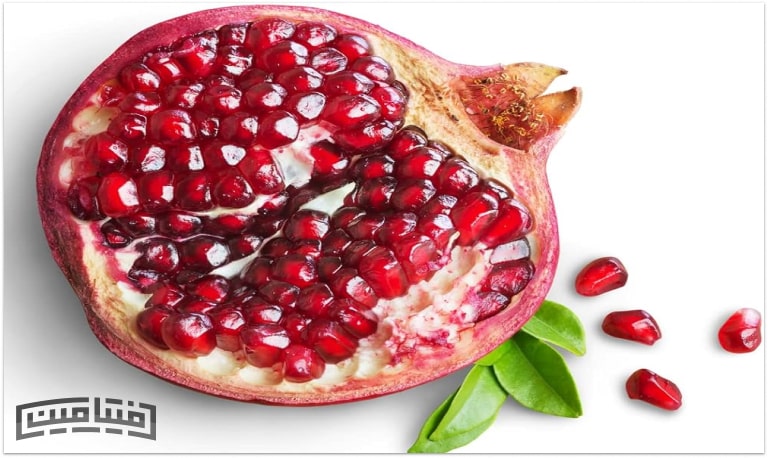Do you know the properties of pomegranate? Pomegranate is a beautiful, tasty and useful fruit and we know it as a heavenly fruit. Did you know that the origin of pomegranate reaches Iran?! Pomegranate was obtained in the region of modern Iran and ancient Iran (now Afghanistan and Pakistan). This delicious fruit was later cultivated throughout the Mediterranean, Asia and Africa. It was at the end of the 16th century that pomegranate was brought to America by the Spanish, and today it is cultivated and used even in California. In this article, we will talk about the nutritional value and properties of pomegranate.
Brief introduction of pomegranate and its nutritional value table
Before we go to the properties of pomegranate, let us talk about its nutritional value. All of us Iranians know pomegranate. Pomegranate is a delicious fruit with a sweet and sour taste and a thick red skin. Its skin is not edible (it has other uses), but its seeds are juicy and very tasty. We can eat pomegranate seeds, or put them on salads and some foods (like hummus).
Pomegranate has always been a popular and delicious fruit for us, but modern research also shows that the antioxidants in pomegranate can help protect the heart. The anti-inflammatory properties of pomegranate can be effective in the treatment and prevention of cancer.

Nutritional value table
Fresh pomegranate is a very nutritious fruit; It is low in calories and fat and has a lot of fiber, vitamins and minerals. You can see the nutritional value table of half a large pomegranate below.
| calories | 72 |
| Protein | 2.35 grams |
| fat | 1.6 grams |
| Carbohydrate | 26 grams |
| fiber | 5.5 grams |
| sugar | 20 grams |
How many calories does pomegranate have?
It is true that the benefits and properties of pomegranate are many and it has a high nutritional value, but when adding it to your program, it is better to pay attention to its calories. Now we will tell the calories of pomegranate in different ways.
- Pomegranate: As we said above, pomegranate calories are not very high. A medium-sized pomegranate has about 230 calories. But since it has a lot of fiber, it will keep you full for a long time.
- Pomegranate juice: Pomegranate juice has more calories than pomegranate, and since you don’t eat pomegranate seeds, you get less fiber. But still, because of the many properties of pomegranate juice, it is worth it! A glass of pomegranate juice contains 134 calories.
- Pomegranate paste: Due to the high concentration of natural sugars, it has more calories and can be around 40-50 calories per tablespoon.
- lavashk Pomegranate: It is a thick and sweet food and has about 300 calories per 100 grams. Of course, if sugar has been used in its preparation, this amount will be much higher.
- Pomegranate tea: It is usually low in calories and if you don’t put sweetener like candy in the teapot, it has very few calories; You will get only 5 calories from each cup of pomegranate tea.
How to prepare pomegranate tea: Pour pomegranate seeds with dry tea into a teapot and pour boiling water over it, let it brew for half an hour, the tea is ready!
Know the properties of pomegranate!
Pomegranate has many benefits for your health and most of its benefits are due to the high level of antioxidants in pomegranate. For example, pomegranate can have up to three times more antioxidants than green tea or red wine. Antioxidants are compounds that protect your cells from harmful chemicals and reduce internal inflammation. You can read other properties of pomegranate for health below:
1. Better heart health
Polyphenol is one of the important types of antioxidants and pomegranate is a rich source of polyphenol. There is evidence that polyphenols protect against cardiovascular disease, including reducing cholesterol and fat accumulation in blood vessels or helping to lower high blood pressure.
2. Prevention of thickening of the vessel walls
Pomegranate contains polyphenol compounds called punicalagins or ellagitannins. These antioxidants prevent the thickening of the vessel walls and reduce the accumulation of cholesterol and plaques.
Pomegranate juice is also high in plant pigments called anthocyanins and anthoxanthins, which support heart health. Pomegranate juice can help lower LDL cholesterol, or “bad cholesterol,” which clogs arteries, and increase HDL cholesterol, or “good cholesterol,” which reduces the risk of strokes and heart attacks.
In a clinical trial, overweight or obese subjects who took pomegranate extract supplements for 30 days experienced weight loss, reductions in blood sugar, insulin, triglycerides, total cholesterol, LDL-to-HDL ratio, and blood markers of inflammation.


3. Lower blood pressure
Another property of pomegranate is lowering blood pressure. Studies show that pomegranate juice can lower blood pressure, which may be due to reducing stress caused by reactive oxygen species (or free radicals), reducing inflammation, and improving hypothalamic function. The hypothalamus is the part of the brain that controls bodily processes such as appetite, body temperature, and blood pressure.
4. Reducing the risk of some cancers
Because pomegranate is rich in antioxidants and flavonoids, it can prevent free radicals from damaging cells. In some preliminary studies, pomegranate has shown that it can be useful in preventing prostate, breast, lung and colon cancer. Also, animal studies have shown that pomegranate consumption can prevent the growth of lung, skin, colon and prostate tumors. However, more research is needed to better understand these effects in humans.
5. Improving blood pressure and blood sugar levels in people with diabetes
One study found that drinking about 200 milliliters (a little less than a glass) of pomegranate juice for 6 weeks lowered blood pressure in people with type 2 diabetes. Another study found that pomegranate seed oil also reduced fasting blood sugar in people with type 2 diabetes, although it did not appear to change insulin levels. Early studies have shown that people who started drinking pomegranate juice experienced improvements in insulin resistance, but more research is needed to confirm these results.
6. Helping the health of the urinary tract
Another property of pomegranate is related to kidney stones and urinary tract health. A study on people who are prone to kidney stones showed that pomegranate juice can prevent the formation of kidney stones. When your blood is less concentrated, you are less likely to develop kidney stones.
7. Helping the health of the digestive system
Research shows that pomegranate has prebiotic effects. Prebiotics are compounds in food that beneficial gut bacteria use for nutrients. Good gut bacteria are very important for digestive health. The gut microbiome plays an important role in protecting the body against chronic diseases such as inflammatory bowel disease (IBD), type 2 diabetes, cardiovascular disease, and colon cancer. Pomegranate seeds also contain a lot of fiber, which is another way to help maintain a healthy digestive system.


8. Support brain health
Ellagitannins, which are polyphenols found in pomegranates, help reduce inflammation throughout the body. Early studies have shown that ellagitannins may protect against Alzheimer’s and Parkinson’s disease by fighting the damaging effects of free radicals and inflammation in the brain.
9. Helps joint health
The last property of pomegranate is related to joints. An extensive study showed that the antioxidants in pomegranate can help reduce symptoms and prevent complications in people with rheumatoid arthritis. Another study showed that pomegranate can prevent the occurrence of osteoarthritis, which is the most common type of arthritis caused by joint wear.
Are there side effects to consuming pomegranate?
We said everything about the properties of pomegranate. But does this heavenly fruit have side effects? Pomegranate is usually without side effects. But some people may experience unwanted side effects. Allergic reaction to pomegranate is rare but may occur in some cases. If you’re allergic to plants, watch out for possible symptoms, which could include hives or trouble breathing.
If you have diabetes, keep in mind that pomegranates, like most fruits, are high in sugar. Pomegranate also has a lot of potassium, which is better if you have kidney disease, so be careful. Pomegranate can also interact with some medications; Medicines such as:
- ACE inhibitors or other high blood pressure medications
- Crestor and other drugs for high cholesterol
- blood thinners such as warfarin (Coumadin)
final word
Pomegranate is a delicious and beautiful fruit that has many health benefits. This fruit can help cardiovascular health, lower blood pressure and improve digestive function. In this article, we talked about the properties of pomegranate in detail and introduced its nutritional value. In addition, in some cases it is necessary to be more careful in consuming pomegranate. We also explained these things.
Resources: webmd
RCO NEWS
RCO

















